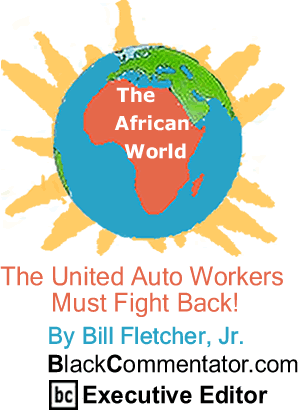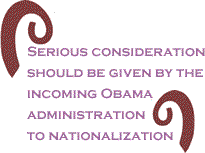
|
|||||||||||||||||||||||

|
|

Custom Search
|
|
 |
|
When I awoke on Friday morning, December 12th, I turned on my computer. The first thing I saw was that the deal being worked on in the Senate to provide the automobile companies with loans had fallen through. The explanation offered on MSN: the United Auto Workers (UAW) refused to take a pay cut. I found myself furious about the situation. Let us be clear that the deal did not fall through because the UAW had refused a pay cut. The deal fell through because the Republicans, who had consistently opposed the loan effort, seek to drive the auto companies into bankruptcy so that they can destroy the UAW. Those leading the charge against the proposed loan (which has been misnamed a “bailout”) publicly seek to force the UAW to accept the same wage rate as the non-union (foreign) auto facilities which, by coincidence, are located in many of the states of these Republican Senators.
For the right-wing Republicans, these concessions were not good enough. It was not good enough that the UAW had been virtually brought to their knees. The Republicans wanted the UAW on all fours, kissing the ground. This is what was at stake in their undermining a loan deal in Congress. The UAW leadership obviously concluded that they had retreated as far as they were going to retreat, at least for the moment, and that they were not going to accept further humiliations. The contrast in the treatment
of the auto companies with the Wall Street bailout has been elaborated
upon by countless writers. It is the height of hypocrisy. It is no exaggeration that an auto collapse will have a dramatic impact on the already dire economic situation we are experiencing, a crisis that may be evolving from a recession into a depression. Many other industries depend on the auto industry, so it is not just auto jobs that are at stake. In addition, this will mean an increase in job loss for African Americans, already a population which has suffered disproportionately as a result of the millions of jobs lost in manufacturing over the recent period.
That said, the fight for the immediate survival of the auto companies should be a battle that the UAW itself is conducting publicly, loudly and militantly. Frankly, I do not see it unfolding at the moment and I am a bit mystified. The UAW leadership seems to have gone out of its way to operate under the cape of the auto companies rather than staking out any independent turf of its own. Worse, when UAW President Ron Gettelfinger has been publicly asked about the mismanagement of the auto companies - a softball question that should have been knocked out of the park - he walks around the answer. Instead of pointing out the shortsightedness of the auto owners in the cars they have built, their approach to emission standards and fuel consumption, Gettelfinger has done dances that would put a smile on the face of the late Gregory Hines. On top of all of this, the UAW, which remains an important and large union, has done little to mobilize its members into the streets to make their case. The only face we see is that of Gettelfinger, and particularly for those of us of color, unless you have an auto worker in your family, you could forget that a substantial proportion of the auto workforce is African American and Latino! The lack of UAW visibility and
militancy weakens their case. I just want to see the UAW make
plain THEIR case and touch the hearts of people of the BlackCommentator.com
Executive Editor, Bill Fletcher, Jr., is a Senior Scholar with the
Institute for Policy Studies,
the immediate past president of TransAfrica
Forum and co-author of, Solidarity Divided: The Crisis in Organized Labor and
a New Path toward Social Justice
|
|
Any BlackCommentator.com article may be re-printed so long as it is re-printed in its entirety and full credit given to the author and www.BlackCommentator.com. If the re-print is on the Internet we additionally request a link back to the original piece on our Website. Your comments are always welcome. eMail re-print notice
If you send us an eMail message we may publish all or part of it, unless you tell us it is not for publication. You may also request that we withhold your name. Thank you very much for your readership. |
|
| |
|
| December 18, 2008 Issue 304 |
|
| Executive Editor: Bill Fletcher, Jr. |
| Managing Editor: Nancy Littlefield |
| Publisher: Peter Gamble |
| Est. April 5, 2002 |
Printer Friendly Version
in resizeable plain
text format or pdf
format. |
| Frequently Asked Questions |
 |

|
 |
 |
 |
| |
| |





























 This
situation is filled with irony. The UAW, a once proud union that
played a major role in elevating Black (and other) auto workers
out of poverty, has been in a fairly consistent retreat since the
early 1980s. At that time the leadership of the UAW chose to engage
in what they saw as a partnership or “jointness” with the auto company
owners. As such, the UAW offered concession after concession to
the auto companies, infuriating much of their own membership, but
justified by the leadership as helping the companies to stay afloat.
In fact, in the most recent collective bargaining agreement signed
by the UAW with the Big Three, there was a MAJOR concession offered
(and accepted) which resulted in a two-tier situation. Two tier
means that new employees would not receive the same wages and benefits
of current employees. Again, this was done in the name of saving
jobs and saving the companies, but it further weakened the UAW in
the eyes of many of its own members and many of its friends.
This
situation is filled with irony. The UAW, a once proud union that
played a major role in elevating Black (and other) auto workers
out of poverty, has been in a fairly consistent retreat since the
early 1980s. At that time the leadership of the UAW chose to engage
in what they saw as a partnership or “jointness” with the auto company
owners. As such, the UAW offered concession after concession to
the auto companies, infuriating much of their own membership, but
justified by the leadership as helping the companies to stay afloat.
In fact, in the most recent collective bargaining agreement signed
by the UAW with the Big Three, there was a MAJOR concession offered
(and accepted) which resulted in a two-tier situation. Two tier
means that new employees would not receive the same wages and benefits
of current employees. Again, this was done in the name of saving
jobs and saving the companies, but it further weakened the UAW in
the eyes of many of its own members and many of its friends.
 I
unapologetically believe that the auto companies need to get the
interim loans with public oversight. I also believe that more needs
to be done: the
I
unapologetically believe that the auto companies need to get the
interim loans with public oversight. I also believe that more needs
to be done: the 






